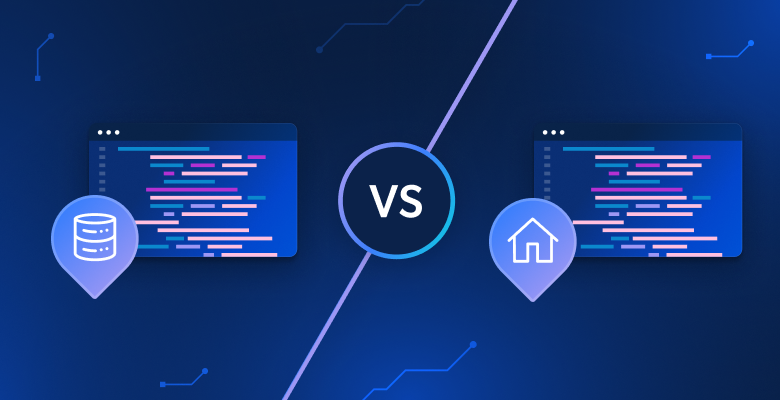With many online YouTubers and influencers promoting VPN services, these have become increasingly popular. But are they better than proxies for web scraping?
This in-depth guide will cover:
- Definition of VPN and proxy.
- Proxy server vs VPN server: How do they work?
- Proxy vs VPN for web scraping.
Time to answer that question!
Definition of VPN and Proxy
A VPN, short for Virtual Private Network, is a technology to create a secure and encrypted connection over a public network. In detail, it allows you to access and transmit data as if you were connected to a private network.
To achieve that, a VPN establishes a secure tunnel between your device and the VPN server, encrypting all data passing through it. This mechanism ensures that any sensitive information transmitted over the channel is protected from potential eavesdropping or unauthorized access. Also, it masks your IP, making it appear as if you are accessing the Internet from the VPN server’s location. For maximum security, the VPN takes care of routing all Web traffic through the secure channel.
Similarly, a proxy acts as a middleman between your device and the destination site. When you visit a web page through a proxy, the request passes through a proxy server before reaching the destination server.
Thus, the client sends requests for a specific online resource. The proxy server intercepts it, forwards it to the destination, receives the response from the target server, and sends it back to you. The target site will then see the requests as coming from the proxy server and not from you. Just as before, this system protects your IP address and allows you to bypass geo-restrictions. Check out our guide to learn more about proxy servers.
As you can see, the two technologies have a lot in common. To better understand the difference between VPN and proxy, you have to understand how they work. Time to dig into VPN vs proxy!
Proxy Server vs VPN Server: How Do They Work?
Let’s start with proxies, which are easier to understand than VPNs.
A proxy server operates at the application layer, intercepting and forwarding client requests to destination servers. Suppose your application has been configured to use a proxy, here is what would happen:
- The application sends a request for a specific resource to the proxy server, specifying the URL of the destination resource.
- The proxy server intercepts the client’s request and examines the original destination specified in the request.
- The proxy server forwards the request to the appropriate destination server on behalf of the client.
- The destination server processes the request and sends the response back to the proxy server.
- The proxy server receives the response from the destination server and forwards it back to the client.
Instead, a VPN operates at the network layer, creating and managing a secure communication channel between the client and the VPN server. Suppose a VPN has been set up on your device, here is what would occur:
- The VPN client software on the client’s device negotiates an encrypted connection protocol with the VPN server.
- The client’s device and the VPN server authenticate each other through digital certificates, a pair of credentials, or similar approaches to ensure a secure connection.
- The VPN software and the VPN server establish an encrypted tunnel between them to achieve confidentiality
- Any data sent from the client’s device via the Internet is encrypted and sent to the VPN server.
- The VPN server receives the encrypted data from the client, decrypts it, and forwards it to the destination server.
- The destination server processes the request and sends the response back to the VPN server.
- The VPN server encrypts the response and sends it back to the client’s device.
- The VPN software on the client’s device decrypts the response got from the VPN server.
Both technologies are great for protecting your identity, but which one is better for web scraping? Find out in the next chapter!
Proxy vs VPN for Web Scraping
Proxy and VPN both provide a means to hide one’s IP address, protect online identity, and avoid geographic restrictions. These elements are all useful when it comes to web scraping, but there are some key aspects to consider when figuring out which solution is better. Let’s look at them all!
Purpose
VPN and proxy both act as intermediaries between client and server, routing network requests through a server. The main difference is that a VPN operates at the operating system level, routing all network traffic made by a device. Instead, a proxy operates at the application level, routing only traffic from particular applications.
Therefore, proxies offer more granular control over the data sent through the intermediary servers. This application-level approach to routing is more versatile than VPNs, enabling different scraping requests to pass through different proxy servers, even on the same script.
So, VPNs are a general protection system that treats all requests the same at the OS level, while proxies can be used only when required by applications.
Integration
VPN providers generally provide user-friendly applications that can be installed globally in the OS with just a few clicks. This makes VPN an accessible solution for non-technical users seeking privacy and security. However, this software is less controllable and suitable for integration into web scraping scripts.
On the other hand, not all proxy providers offer easy-to-use tools or browser extensions to manage them. This results in a more complex configuration process. The reason is that most proxies are designed for technical users, especially in the case of web scraping proxies. After all, it is no accident that most HTTP clients support integration with web proxies.
Security
Proxy servers offer different levels of anonymity, from none to complete. Unlike VPNs, they do not encrypt traffic passing through them. This is probably the main difference between proxy and VPN.
Therefore, VPNs offer more robust security measures to safeguard Internet traffic from prying eyes. That means ISPs can monitor proxy traffic, but they cannot understand VPN traffic due to its encrypted nature.
The real question is, do you really need to encrypt data in web scraping? Considering the performance consequences, it may not be the case.
Performance
Because of the absence of data encryption and decryption, proxies usually offer faster performance than VPNs. Keep in mind that performance results change depending on the type of proxy and VPN under analysis. For example, a residential proxy might be slower than a premium VPN.
Even though advances in speed and network infrastructure have narrowed the gap between the two solutions, proxies remain the winning choice for fast data scraping.
Cost
Proxies are available both for free and for a charge. Frequently, providers offer attractive deals through on-demand and subscription offerings. Their goal is to support web scraping projects that require numerous IP addresses.
In contrast, VPNs tend to be more expensive because VPN software typically tends to offer additional features, such as general web protection, password management, and ad-blocking capabilities. Yet, none of these features are useful for data scraping. Thus, you end up paying more for no significant benefits.
VPN vs Proxy: Summary
The better solution for web scraping? Proxies!
See why in the summary proxy vs VPN table below:
| Aspect | Proxy | VPN |
| Goal | Secure only the traffic of specific applications, such as that of a web scraper | Securing all network traffic of a device |
| ISO/OSI Layer | Application layer | Network layer |
| Integration | Usually at the code level, programmatically and controllably | Through software installed in the OS that cannot be controlled by code |
| Security | Variable anonymity levels with no data encryption | Strong encryption and advanced privacy measures |
| Performance | Fast | Slower due to data encryption and decryption |
| Cost | Available for free or for a fee, with subscription and pay-as-you-go options | More expensive. Available for free or for a fee, with subscription options. |
| IP Rotation | Support for automatic IP rotation | Limited IP rotation that may require manual action in the software |
| User-Agent Manipulation | Allows custom User-Agent headers | Limited support for User-Agent headers |
| Supported Protocols | HTTP, HTTPS, and SOCKS | VPN-specific protocols, such as OpenVPN, L2TP, and IPSec |
Why You Need a Proxy for Web Scraping
As you saw here, proxies are a great tool for retrieving data online. In summary, here are the top three reasons why you should always adopt a proxy when scraping the web.
- Anonymity: Proxies help hide your IP address, protecting your privacy. Without a proxy, your IP address can be easily identified and banned. You do not want your IP to lose legitimacy because of this.
- Avoid blocks: If your web scraper makes too many requests from the same IP, it may arouse suspicion and trigger some protection measures such as CAPTCHAs. Proxies allow you to distribute requests over several IP addresses, reducing the risk of being blocked.
- IPs from all over the globe: Proxies allow websites to be accessed from different geographic locations, granting access to regionally restricted content or sites that block requests from certain locations.
Conclusion
In this article, you learned what VPNs and proxies are and how they work. By exploring their respective features in more detail, you figured out why you should not really use a VPN for web scraping. In particular, you saw that proxies are faster and often cheaper, as well as being designed for scraping data from the Web.
What is the next step? Choose a reliable proxy provider that suits your needs. Trying them all would take months, though. But we have sorted out that problem for you!
Bright Data controls the best proxy server, serving over 20,000 customers and Fortune 500 companies. Its worldwide proxy network involves:
- Datacenter proxies – Over 770,000 datacenter IPs.
- Residential proxies – Over 150M residential IPs in more than 195 countries.
- ISP proxies – Over 700,000 ISP IPs.
- Mobile proxies – Over 7M mobile IPs.
That is one of the largest and most reliable scraping-oriented proxy infrastructures on the market. But Bright Data is more than just a proxy provider! It also offers top-notch web scraping services, including a web scraper IDE, a scraping browser, and a scraping API.
If you need help, the industry-awarded 24/7 customer support will offer assistance right away. Bright Data provides phenomenal reliability, availability, and performance for any online data extraction task.
FAQ
Yes, it is possible to use VPN and proxy together, but setting them up may require some configuration tricks. Plus, it would result in adding two intermediaries, slowing down the Internet connection without any real additional benefit.
For web scraping, not really. If you instead want your data to be encrypted in addition to being able to choose servers around the world, then a VPN can be a good solution.
Some proxies and VPNs are available for free, but this raises concerns about data usage. Free services can compromise privacy or security, so opting for reputable paid options is always the recommended approach.







